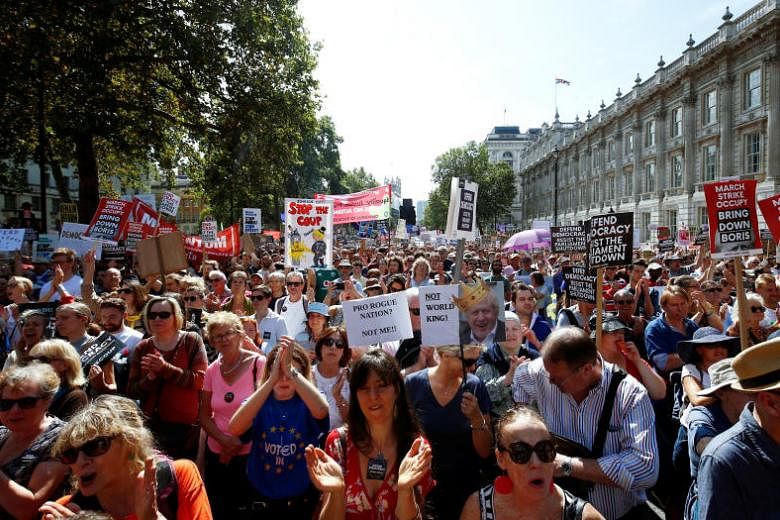LONDON (NYTIMES) - Tens of thousands of people gathered on the streets outside the British prime minister's home and across Britain on Saturday (Aug 31) in hastily planned protests against what they called the government's anti-democratic decision to cut short parliamentary debate and push through Brexit.
They chanted in defence of migrants and waved European Union flags, but their enthusiasm for staying in the bloc took a back seat on Saturday to anger at what many saw as a blossoming, and more urgent, threat: a willingness by Prime Minister Boris Johnson to stretch or outright disobey the Constitution in service of Brexit.
"If you shut down Parliament, we shut down the streets!" demonstrators shouted in unison as they swarmed black cabs and double-decker buses at Trafalgar Square in central London.
After they succeeded in stopping traffic, they pulled out takeout salads and bags of carrots and picnicked in front of the honking cars.
The protesters denounced Johnson's decision this past week to banish Parliament for five weeks at the height of a political crisis over Brexit, one that has grown progressively more heated since Johnson took office with a vow to pull Britain out of the European Union, with or without a deal, by Oct 31.
Johnson's allies believe the maneuver gives him leverage in negotiations with Brussels by cutting the legs out from under his domestic rivals.
But the move broke from precedent in lopping weeks off the time opposition lawmakers have to stop what they see as a potentially disastrous no-deal Brexit.
And protesters, along with many constitutional scholars, said Johnson was putting at risk the evolving set of laws and traditions that make up Britain's Constitution.
"He's undermining democracy by shutting down Parliament," said Lucy McNaught, 25, handing out flyers for a bicycle protest planned in the coming week, as part of a wave of demonstrations.
That the British Constitution did not explicitly forbid the move was beside the point, she and other protesters said. While it is common for prime ministers to occasionally suspend Parliament for a few days, "he's completely manipulating that," McNaught said.
Demonstrators also turned out in Brighton, Bristol, Leeds, Manchester, Sheffield and Edinburgh, among other places. In London, they marched from Downing Street, chanting "Stop the coup!" and "Migrants in, Boris out!"
After several hours, the police began clearing demonstrators who were still blocking traffic from Trafalgar Square, arresting a few people.
Dozens of rallies were staged overall, including ones beyond Britain's borders, in Ireland, Germany, the Netherlands and Sweden.
Protesters waving European flags even gathered outside Balliol College, Johnson's alma mater at Oxford.
The London demonstrations attracted pro-Europe marchers who have turned up again and again in recent months, sometimes in the hundreds of thousands. But they also drew new protesters, who said that learning this past week of how far Johnson would go to undermine anti-Brexit lawmakers had ignited a different kind of anger.
"This sets a dangerous precedent," said Caitlin O'Hara, 21, who was at her first anti-Brexit protest, along with her younger sister. "I think it is completely outrageous. Completely undemocratic."
Holding a sign that said "Loving Britain = Loving Democracy," O'Hara said she supported a second referendum as a way of giving people a chance to register their views three years after the first vote was held.
"If a democracy cannot change its mind," she said, "it ceases to be a democracy." But talk of a second referendum was secondary on Saturday to simply stopping Johnson. Lawmakers have said they will try to pass a measure this week forcing him to ask for another Brexit extension and averting a no-deal departure.
The move was threatening enough that Johnson's team was said to be considering whether to bar Conservative members of Parliament who support it from running on the party's ticket in the next general election.
Lawmakers are also considering a vote of no confidence in Johnson, a move that could lead to a caretaker prime minister and a general election. In part because of Johnson's decision to suspend Parliament, their time is running short.
On a stage outside Downing Street on Saturday, lawmakers from the opposition Labour Party vowed to stop him.
"We cannot allow Boris Johnson to shut down Parliament and to shut down the voice of ordinary British people," Diane Abbott, a prominent Labour lawmaker, told the crowd.
Some protesters threatened on Saturday to organise a general strike if Johnson pulled Britain out of the European Union without a deal. As grudging as their admiration for politicians might be, they still wanted lawmakers to be in session. "Even this Parliament is better than no Parliament," read one sign.
"I think people are getting angry," Maryse Hodgson, 73, said as she walked with her husband, John Hodgson, 77, toward the stage outside Downing Street.
"What we have now is a parliamentary democracy," she said. "Suspending Parliament is the end of democracy." Her husband warned, "It will take England 10 years to recover from this."
Johnson's allies have dismissed the protests as the whining of so-called Remainers, with Jacob Rees-Mogg, the Conservative leader of the House of Commons and a hard-line Brexiteer, calling the furor a "candyfloss of outrage."
But protesters tried to give the impression that - as hard as it was to hold the public's interest amid three years of political turmoil - they intended to use the decision to suspend Parliament as a spur to organise and draw in new supporters.
One of their signs suggested all the picnicking and lounging on the asphalt at Trafalgar Square belied their determination: "Yes, we're polite and good-humoured, but we're very serious," it said.
Police officers eventually tried persuading the demonstrators to leave the traffic circle, with little luck. Honks of car horns were met by a chorus of boos. One taxi driver, resigned to being stuck, simply lit a cigarette and watched.











